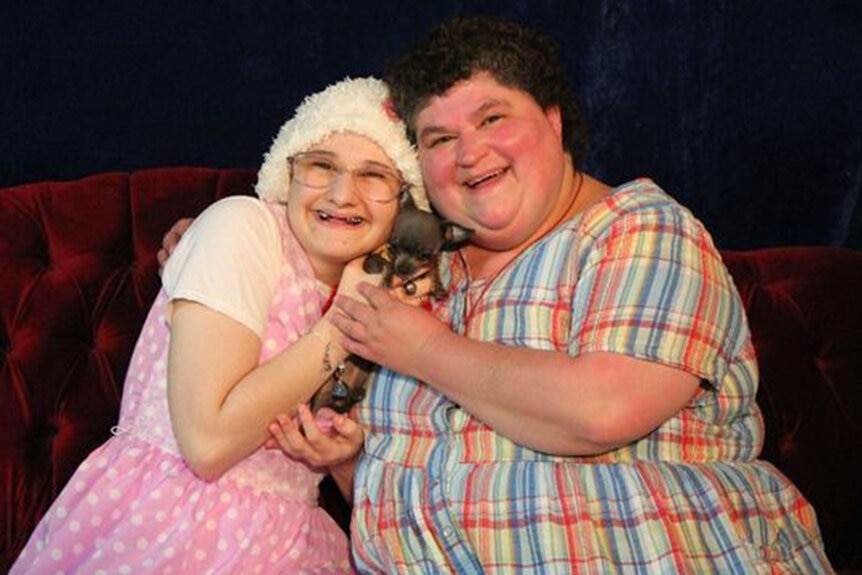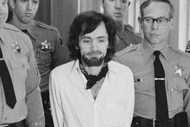Create a free profile to get unlimited access to exclusive videos, breaking news, sweepstakes, and more!
Everything You Need To Know About the Gypsy Rose Blanchard Case
A murdered mother, an online lover, and the violent pact to end an alleged cycle of childhood abuse.

The 2015 murder of Clauddine "Dee Dee" Blanchard and the criminal case that unfolded against Gypsy Rose Blanchard, her daughter, drew sensational media attention not only for its tragic events, but for exemplifying to many observers that real-life narratives — even after the facts of a crime have been reported — aren’t always as they seem.
Dee Dee Blanchard was found in her bedroom near Springfield, Missouri in June of 2015, dead from multiple stab wounds at the hands of her eventual convicted killer, a then 26-year-old Wisconsin man named Nicholas Godejohn.
RELATED: Gypsy Rose Blanchard Blasts Her Husband's Haters, Says He's "Rocking My World Every Night"
Godejohn and Gypsy Rose — at the time a 23-year-old woman believed by friends and neighbors to be younger, thanks to her appearance as well as her mother’s reported secrecy surrounding Gypsy Rose’s true age — had met and then maintained their long-distance relationship mostly over the internet.
After Godejohn and Gypsy Rose were apprehended, together in Wisconsin only days after the Missouri murder, public opinion surrounding her already well-publicized reputation as a chronically ill and mentally impaired daughter made a sensational shift as background information about the family came to light.
Gypsy Rose wasn’t the helpless, perpetually ailing child her mother always had insisted that she was — and Dee Dee, according to Gypsy Rose and other witnesses who emerged — wasn’t simply a struggling single mom doing all she could to bring Gypsy Rose to full health.
Who is Gypsy Rose Blanchard?
Born July 27, 1991, Gypsy Rose Blanchard began her childhood in Louisiana, where she and her mother would move about through the early years of her life, living in a number of small towns never far from the fringes of New Orleans. Gypsy Rose’s father, Rod Blanchard, had broken away from Dee Dee not long before Gypsy Rose was born, and would later tell BuzzFeed News that Dee Dee believed her daughter suffered from sleep apnea when Gypsy Rose was only 3 months old.
That informal diagnosis would be the first in what proved a pattern in Dee Dee’s extraordinary care regimen: throughout Gypsy Rose’s childhood, Dee Dee appeared convinced that her daughter was illness-prone and afflicted with a variety of disabling conditions, and she portrayed Gypsy Rose to the people in their lives as a fragile child not healthy enough to engage in typical social activities.
As Gypsy Rose got older, communities and charitable organizations began to galvanize around Dee Dee and her daughter, gifting the family with items and services aimed at aiding their seemingly adverse circumstances. Until the mid-2000s, when mother and daughter moved away, her father remained a visiting presence in her life, attending local Special Olympics events with Gypsy Rose and other family members.
Dee Dee, meanwhile, kept Gypsy Rose on an active schedule of medical visits, taking her to different doctors in a constant quest to diagnose or treat her alleged illnesses — a long list of maladies she reportedly claimed stemmed from a chromosomal disorder, including muscular dystrophy, leukemia, epilepsy, poor eyesight, and more.
Though physicians often couldn’t find lab-supported evidence to corroborate Dee Dee’s health concerns, she was able to obtain prescription medications that appear to have taken a cumulative toll on Gypsy Rose. While still a child, many of her teeth had decayed or fallen out from the combined effects of her seizure medication and the removal of her salivary glands — a measure Dee Dee reportedly insisted was necessary to prevent her daughter from drooling.
Gypsy Rose would later tell ABC News that Dee Dee had induced the drooling reflex intentionally, administering a topical anesthetic to Gypsy Rose’s gums in order to persuade doctors that she needed treatment. In any case, it wasn’t a singular phenomenon: Surgeries, prescriptions, and clinical visits were routine through Gypsy Rose’s childhood, and her mother took her out of school to keep her at home during Gypsy Rose’s elementary years.
Hurricane Katrina struck in 2005 while the pair was living in public housing in the New Orleans outskirt city of Slidell, and the storm wrought the same damage on their apartment as it did across the wider area. Following a brief stay at a relief shelter in the north-shore Lake Pontchartrain town of Covington, they were airlifted to a new home in Missouri.
An uplifting media narrative, already buoyed by periodic feature coverage of the family’s perseverance, brought fresh attention to the family’s ordeal through Katrina and beyond, and by 2008, Dee Dee and Gypsy Rose were living in a new Habitat for Humanity home — complete with accessibility features including a wheelchair ramp — in the Springfield, Missouri area.
Who is Dee Dee Blanchard?
A Louisiana native, Dee Dee Blanchard was 48 years old at the time of her murder. Much of what is known of her early life has come in the form of family testimonials shared with media after her death. In the 2017 HBO documentary Mommy Dead and Dearest, family members said she showed an early propensity for theft as a form of personal retribution, and even suspected that she may have hastened the death of her ailing mother by withholding food from her.
Controlling relationships by manipulating the private, intimate nuances of family dynamics may have been an early trait that Dee Dee carried into adulthood, that documentary revealed. She reportedly held a tight rein on Gypsy Rose’s childhood attempts at doing more than her fragile and sickly image suggested, delivering behavioral cues by tightly squeezing Gypsy Rose’s hand when in public, and severely restricting her unsupervised access, via phones and computers, to the outside world.
Dee Dee appears to have worked as a nurse’s aid in her early adulthood at some point, making her conversant enough in clinical culture, her family believes, to cue physicians and staff toward particular outcomes for Gypsy Rose. By the time Katrina hit in 2005, the occasion allowed her to inform Gypsy Rose’s doctors in their new Missouri home that Gypsy Rose’s medical records had been lost in the resulting flood — a story that later was proven false, via court discovery, after Dee Dee's murder.
RELATED: Gypsy Rose’s Former Boyfriend Nick Godejohn Opens Up About His Childhood
Though her family suspected her of abuses that predate the birth of Gypsy Rose (Gypsy Rose’s stepmother Laura told HBO that Dee Dee had tried to poison her with weed killer, for instance), her only documented criminal history had involved non-violent infractions like writing bad checks. But Gypsy Rose said in the same documentary that the threat of physical force always loomed in their home: Dee Dee had reportedly smashed Gypsy Rose’s computer with a hammer in one of her earlier attempts at contacting a man, tying her to a bed for two weeks after the incident and threatening to break her hands with a hammer if Gypsy Rose ever attempted anything similar again.
What is Munchausen syndrome by proxy, now called factitious disorder imposed on another?
Not long before Dee Dee’s murder, at least one doctor — Missouri pediatric neurologist Bernardo Flasterstein — observed that much of what Dee Dee said about Gypsy Rose’s health needs could not be confirmed by medicine, and suspected that Dee Dee had been fabricating her daughter’s narrative of sicknesses and symptoms by abusing her position as Gypsy Rose’s caretaker — a phenomenon known as factitious disorder imposed on another (FDIA), and formerly referred to as Munchausen syndrome by proxy.
In the current version of professional mental health guide the Diagnostic and Statistical Manual of Mental Disorders (DSM), FDIA is described as imposing fabricated symptoms of illness on another person as a means of gaining the sympathy of others, rather than addressing the purported underlying sickness itself. Typically demonstrated by mothers or other people in a caretaker’s role, the psychological basis for FDIA lies with the caretaker and not with the patient, and indicates that sympathy or attention — not money or other material rewards — serves as the caretaker’s reason for misrepresenting a patient’s needs.
In cases where a person makes similar false health claims on their own behalf, the phenomenon historically has been referred to as Munchausen syndrome. The “by proxy” appellation is applied in cases such as Gypsy Rose’s, when a caretaker projects false symptoms onto the person in their care.
Who is Nicholas Godejohn?
Born in 1989, Nicholas Godejohn was 26 years old and living in Big Bend, Wisconsin at the time of Dee Dee Blanchard’s murder. Despite Dee Dee’s reported attempts to limit Gypsy Rose’s online contact with others, he and Gypsy Rose met and developed a virtual relationship — one that had lasted about three years by the time of the murder — via internet chat, according to the Springfield News-Leader. He and Gypsy Rose had taken a bus to Wisconsin following the killing, and it was there that police traced an IP address that led them to Godejohn, resulting in the pair’s subsequent arrest.
RELATED: Who Were Nick Godejohn And Gypsy Blanchard’s Alter Egos?
Besides a lewd conduct arrest in 2013, Godejohn had no criminal history or record of violent behavior. But after his arrest, he confessed to investigators that he wielded the knife that stabbed Dee Dee Blanchard as part of a mutually agreed-upon plan between himself and Gypsy Rose (whom he said remained locked in a nearby bathroom throughout the ordeal) to kill Dee Dee and begin a new life together.
Godejohn had been diagnosed with autism at an early age, and tested at an IQ of 82 — with the functional ability of a 10-year-old — during the discovery phase of his murder trial. Godejohn told police that he killed Dee Dee “because [Gypsy Rose] felt it was her only way to be with me,” and that he knew before traveling from Wisconsin to Missouri in June of 2015 — his second visit to see Gypsy Rose— that killing Dee Dee was a planned part of the trip. In the same police interview, Godejohn said that he and Gypsy Rose had sex inside the house after Dee Dee was dead. The pair would later mail the knife that Godejohn used in the stabbing back to Wisconsin, before traveling there themselves by bus.
In November of 2018, a Missouri jury returned a guilty verdict in Godejohn’s trial, convicting him of first-degree murder and armed criminal action. Prosecutors had declined to seek a possible death penalty in the case, leaving Godejohn to serve a mandatory life sentence without parole in prison. In 2022, an imprisoned Godejohn petitioned the court for a new trial, citing ineffective defense counsel during his first one, according to the Springfield News-Leader.
Is Gypsy Rose Blanchard still in prison?
Gypsy Rose Blanchard pleaded guilty in 2016 to second-degree murder, with Missouri prosecutors opting not to pursue a higher charge or maximum prison term owing to the extraordinary circumstances of her case. As part of her plea deal, she was sentenced to 10 years in prison — the Missouri minimum for a second-degree murder charge. Though her 10-year prison term at the state’s Chillicothe Correctional Center was set to end in 2026, Gypsy was let out early on parole on December 28, 2023.
While serving her sentence, she got married in 2022 to Louisiana resident Ryan Scott Anderson, Springfield, Missouri-based station KOLR reported. She was previously engaged to another man.
Originally published Jun 2, 2023.





























